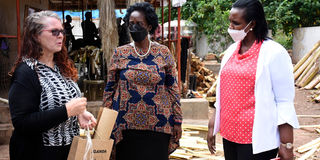Prime
Uganda’s Agoa export earnings drop drastically

Managing Director Jakana Foods Limited Meg Hilbert Jaquay (left) interacts with the Uganda ambassador to USA Robie Kakonge (centre) and Senior Presidential Advisor on Agoa and Trade Susan Muhwezi during a visit at Jakana Factory in Kawempe, Kampala on April 13, 2022. PHOTO/ISAAC KASAMANI
What you need to know:
- Uganda is one African country whose exports are eligible for tariff and quota-free access to the US market under the Agoa initiative
Uganda’s export earnings have dropped tremendously in the last two years as a result of the Covid-19 pandemic that hit the country, the African Growth and Opportunity Act (Agoa) officials have observed.
Uganda is one African country whose exports are eligible for tariff and quota-free access to the US market under the Agoa initiative.
Mr Benson Byaruhanga, the Agoa economist, told Monitor in an interview yesterday that the country’s export earnings dropped from Shs56.6b in 2019 to Shs46.1b in 2020 and to a further Shs40.5b last year due to Covid-19.
“The drastic drop in export from Shs112.1b in 2017/18 to Shs56.6b in the year 2018/2019 was due to many factors. The quality of products dropped and then also the cost of doing business wasn’t favourable and people pulled out of Agoa,” Mr Byaruhanga said.
He said the highest record of exports was registered in 2017/2018, where Uganda’s export earnings stood at Shs112.1b and this was attributed to the ready market in the US for Ugandan products. In 2015, Uganda exported products worth Shs91b to the US under Agoa.
“During the initial stages of the pandemic, we faced logistical issues because there was a scarcity of containers to transport our export to majorly the US, and other countries we export to,” Mr Byaruhanga said in a telephone interview.
He added: “Also we faced a challenge in exporting animal products because production of milk went down while the price went up and exporters couldn’t afford to buy the milk at such high prices.”
The other hindrance cited was a drop in the quality of products.
Mr Byaruhanga said Ugandans are still battling post-Covid effects.
“Since the economy in the US hasn’t yet fully reopened, the market for these products has gone down and that’s one of the reasons we aren’t exporting so much currently but we hope to improve the situation as we are engaging the government to see a way forward,” Mr Byaruhanga said.
He also tasked farmers to take advantage of Agoa.
“Most of them like shortcuts and don’t believe in consistency, they aren’t patient. Once they try exporting through Agoa and don’t make the profit they expect, they leave and try other markets,” the economist said.
Earlier, Mr Byaruhanga accompanied a team from Agoa for a tour to Jakana foods. The team was led by Ms Susan K Muhwezi, the senior presidential advisor on Agoa, who called upon farmers to take advantage of the export policy under Agoa.
Jakana Foods Limited is one of the companies exporting dried fruits under the Agoa initiative.
“We make an appeal to most Ugandans who are into agriculture and farming to do value-addition, take the opportunity created by Agoa. Agoa meets most of the objectives as to why it was created, that is to create employment, bring dollars into the country,” Ms Muhwezi said.
UNBS boss explains
According to the executive director of the Uganda National Bureau of Standards (UNBS), Mr David Livingstone Ebiru, the bureau is working towards ensuring the standards of products are uplifted.
“UNBS has reduced certification charges to promote acquisition of UNBS Quality Mark (Q-Mark). We continue to provide Training and Advisory Services to MSMEs, including providing free copies of standards to organized MSME groups and Associations. We have also translated some standards into local languages to ease their implementation by less educated entrepreneurs,” Mr Ebiru said.
He added: “The challenge, however, relates to the poor quality culture and attitude towards quality standards thinking it’s a costly process, yet it should be considered as part of the business Investment Capital and not an overhead as most perceive it. The future of the markets both locally and internationally will be driven by the quality of products and what values they offer to the consumers and not how cheap their prices are!”
Explaining why some companies are pulling out of Agoa, Mr Byaruhanga said the cost of doing business is currently high.
However, government intervention is underway where trucks for transportation shall be provided to farmers to transport their produce to the airport
“In addition, there shall be negotiations with Uganda Airlines so people can have a fair cost of doing business,” he said.
Agoa provides duty-free access to the US market for more than 6,000 products from Uganda.
READ MORE





